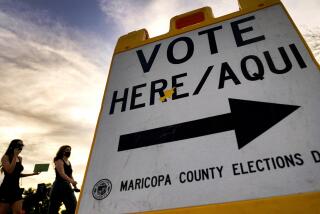Outing your political foes
The fierce fight over same-sex marriage in California and elsewhere is creating pressure to recognize a new free-speech right that could keep petition signatures secret.
The Supreme Court voted last week to block release of the names of more than 138,000 people in Washington state who signed petitions seeking to repeal a same-sex domestic partner law in a ballot scheduled for Nov. 3.
The Supreme Court’s intervention set off a broad debate among election-law experts and 1st Amendment scholars over what is private and what is public when it comes to politics.
Is signing a petition and delivering it to the government a public act, like voting on a bill in the legislature or contributing money to a campaign? Or is it more like casting a secret ballot at the polling place?
The case in Washington was the latest in which gay rights advocates had sought to use public records to expose supporters of anti-gay measures.
“We’ve put close to a million names online,” said Aaron Toleos, co-founder of Boston-based KnowThyNeighbor.org. He said the group had posted the names on petitions seeking rollbacks in gay rights laws in Massachusetts, Florida, Arkansas and Oregon.
When Toleos announced plans in June to do the same in Washington, lawyers for Protect Marriage Washington went to federal court to block the release of the names. They pointed to the scorn and verbal abuse experienced by some who gave money last year to support California’s Proposition 8 ban on gay marriage.
A lower court judge ordered the names withheld. On Oct. 15, the U.S. 9th Circuit Court of Appeals lifted this order in a brief decision, clarified in an opinion released Friday.
But on Tuesday the full Supreme Court, with one justice dissenting, accepted the claim -- at least until the case makes its way through the courts -- that freedom of speech as protected by the 1st Amendment includes both a right to petition the government and a right to do so in confidence.
In doing so, it reversed the 9th Circuit and ordered the protective order to remain in effect indefinitely, an indication the justices believe those objecting to the release will probably prevail.
“The process of signing a petition is political speech,” James Bopp, a lawyer for Protect Marriage Washington, said in his appeal to the high court. This speech will be “chilled,” he added, if the signers of a petition are “harassed, intimidated and threatened.”
In an interview, Bopp, an Indiana lawyer and a prominent conservative, portrayed the dispute as “part of a nationwide effort to harass and intimidate supporters of traditional marriage.”
Toleos said, “We don’t ask people to go confront strangers. This is about finding someone they already know -- a cousin, a friend and co-worker -- and having a civil dialogue.”
In California, petition signatures are not released as public records, but the names of campaign contributors are.
Fred Karger, founder of Californians Against Hate, which organized some of the protests against big donors to the Proposition 8 campaign, said his group targeted only those who contributed $5,000 or more.
“All I’ve done is seek truth and transparency,” Karger said of the boycotts. He considers it inappropriate to harass small donors, such as a manager at El Coyote restaurant in Los Angeles who gave $100 on the advice of a Mormon spiritual advisor. After her name came up on a list of donors, protesters boycotted her restaurant and shouted “shame on you” at customers.
Karger’s group has worked to spotlight what it considers interference by out-of-state religious groups opposed to gay rights, in particular the Church of Jesus Christ of Latter-day Saints.
Karger pointed to a lawsuit filed Thursday by the National Organization for Marriage against Maine’s campaign finance reporting requirements as another attempt to evade scrutiny. The group is the largest donor to efforts to repeal Maine’s gay marriage law.
First Amendment scholar Eugene Volokh of UCLA questioned whether petition signers have a constitutional right to anonymity.
“As a matter of 1st Amendment law, you have the right to speak anonymously but you don’t have a constitutional right to essentially engage in a legally significant action anonymously,” he said. “The state can demand you identify yourself on a petition, and at that point it seems the state is entitled to publish it.”
Signing a petition is more akin to a lawmaker’s vote, which is usually required to be made in public so the citizenry can monitor the progress of the laws that will govern them, legal analysts say.
But Richard Hasen, a Loyola law professor, noted that the Supreme Court in the past has protected civil rights groups and socialists from revealing the names of their members because of fears they could be harassed and intimidated.
“The court would not necessarily construe signing a ballot measure as a 1st Amendment-protected activity,” Hasen said. “But if it is, in fact, true that signers face harassment, I think that’s troubling.”
--
carol.williams@latimes.com
More to Read
Sign up for Essential California
The most important California stories and recommendations in your inbox every morning.
You may occasionally receive promotional content from the Los Angeles Times.












